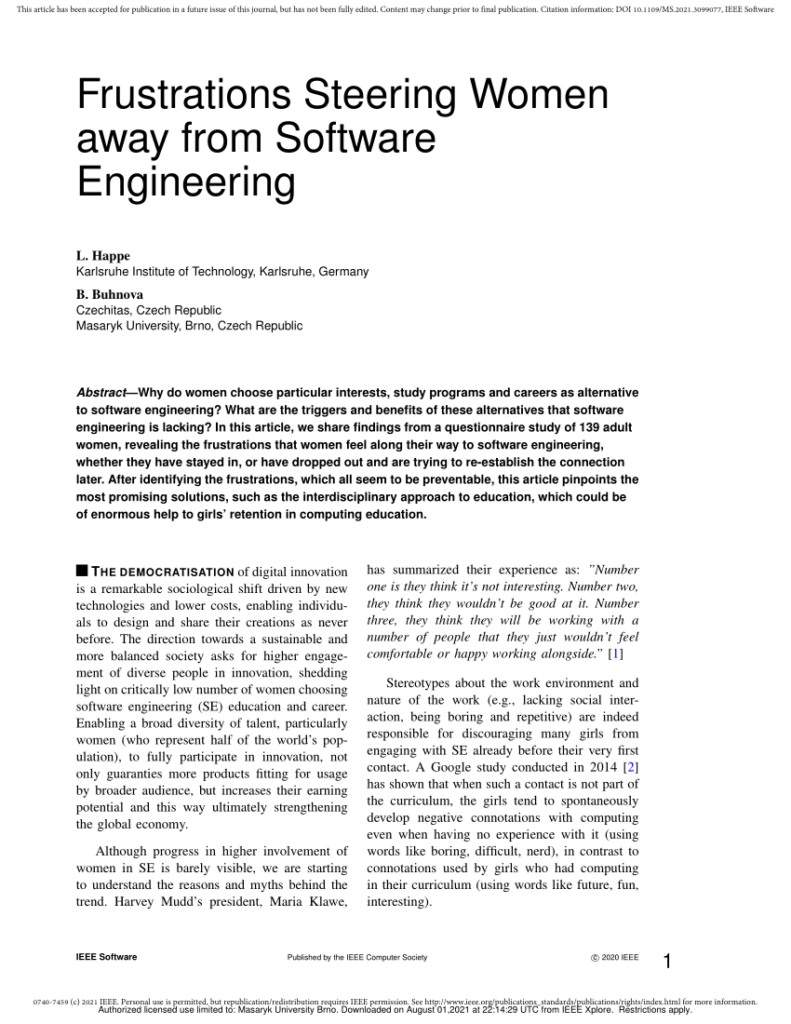Why brilliant girls are turning away from coding: “Why would I want to code a game I wouldn’t want to play? Waste of time.”
Let’s get one thing straight: It’s not because they “just aren’t interested.”
For decades, we’ve been asking the wrong questions about why so few women end up in software engineering. This new study, conducted by researchers Lucia Happe and Barbora Buhnova, finally asks the right question: What happens to girls who were once interested in girls but gave up?
It turns out that a whole world of hidden frustrations pushes girls away from coding before they can thrive. And the solution is simpler than we think.
The “Leaky Funnel” of Talent
The study followed 139 women across three countries, digging deep into what steered them away from or helped them stay in computing. These weren’t random respondents. Most had genuine interest or potential for software engineering but left the path due to experiences that chipped away at their confidence and enthusiasm over time.
The result? A leaky funnel. Talent pours in, but drips out at every stage. Here’s where, and why, it happens:
- They don’t see themselves in the field
Many girls simply don’t feel like they belong. They describe software engineering as a “man’s world” where they’re either invisible or hyper-visible, and not in a good way. From sexist remarks to feeling like they have to change who they are to fit in, the emotional tax is real.
“Right now, I would be really glad if more women worked in IT… I don’t like that feeling that I’m something extra or abnormal.”
- They’re told it’s not for them
Stereotypes run deep. Families and teachers, often with good intentions, nudge girls toward more “feminine” professions, not tech. One woman shared how her father didn’t even let her use the family computer because “women belong in healthcare.”
“Why don’t you do something more of a woman’s thing?”
The result? Many women didn’t even know software engineering was an option, or thought they’d never be good at it.
“In retrospect, I’d like someone to notice that I had my head on computers and kept me there. I had a lot of other interests: guitar twice a week, volleyball twice a week. I took computers like, ‘Yeah, I’d probably like that,’ but I had a lot of other things.” by accidental techie.

- They struggle alone
Girls are often surrounded by more experienced classmates (usually boys) and receive less attention, help, and “success moments.” That’s a recipe for self-doubt. Without early wins, confidence crumbles.
“Girls need a community where they are not afraid to admit that they don’t know something.”
- They have other interests, and that’s seen as a problem
Here’s something surprising: most of the women in the study had multiple passions—on average, 5.5 interests besides computing. But instead of being seen as versatile, this made them feel “less committed” in a culture that prizes coding obsession.
“I am not a person who enjoys computing on its own; I need some higher goal.”
- Their strengths aren’t valued
Women often felt appreciated only when they mimicked male traits and technical know-how, but their other strengths (logic, creativity, communication, user-centred thinking) were undervalued or dismissed.
“IT should be part of every study… We could learn how to model data and make predictions based on some historical events. We could make graphic designs of archaeological sites, whatever…but we didn’t.”

Whatever… but we didn’t – the unofficial motto of missed opportunities in education.
So what can we do?
The answer, according to the results, lies in interdisciplinary education.
Instead of treating computing as a lonely island, we should blend it with other subjects—biology, music, art, and history. This makes coding feel relevant, accessible, and human. Students don’t need to give up their identities or passions; they can bring them into computing.
Think data analysis in archaeology. AI in environmental science. Game design in literature class.
Interdisciplinary teaching offers a powerful message: You belong here. Just as you are.
The problem isn’t that girls “aren’t into tech.” The problem is that we’ve built a culture that makes them, and not only them, feel like outsiders. If we want more women in software engineering, we have to:
- Rethink how we teach, and integrate IT coding across subjects
- Celebrate diverse strengths, not just technical ones
- Spot talent early and nurture it
Because the future of innovation depends on everyone having a seat at the table, not just those who already seem to belong.
Want to dive deeper?
This blog is based on the research article “Frustrations Steering Women Away from Software Engineering” by Lucia Happe and Barbora Buhnova, published in IEEE Software. Read the complete study here →
by Lucia Happe

